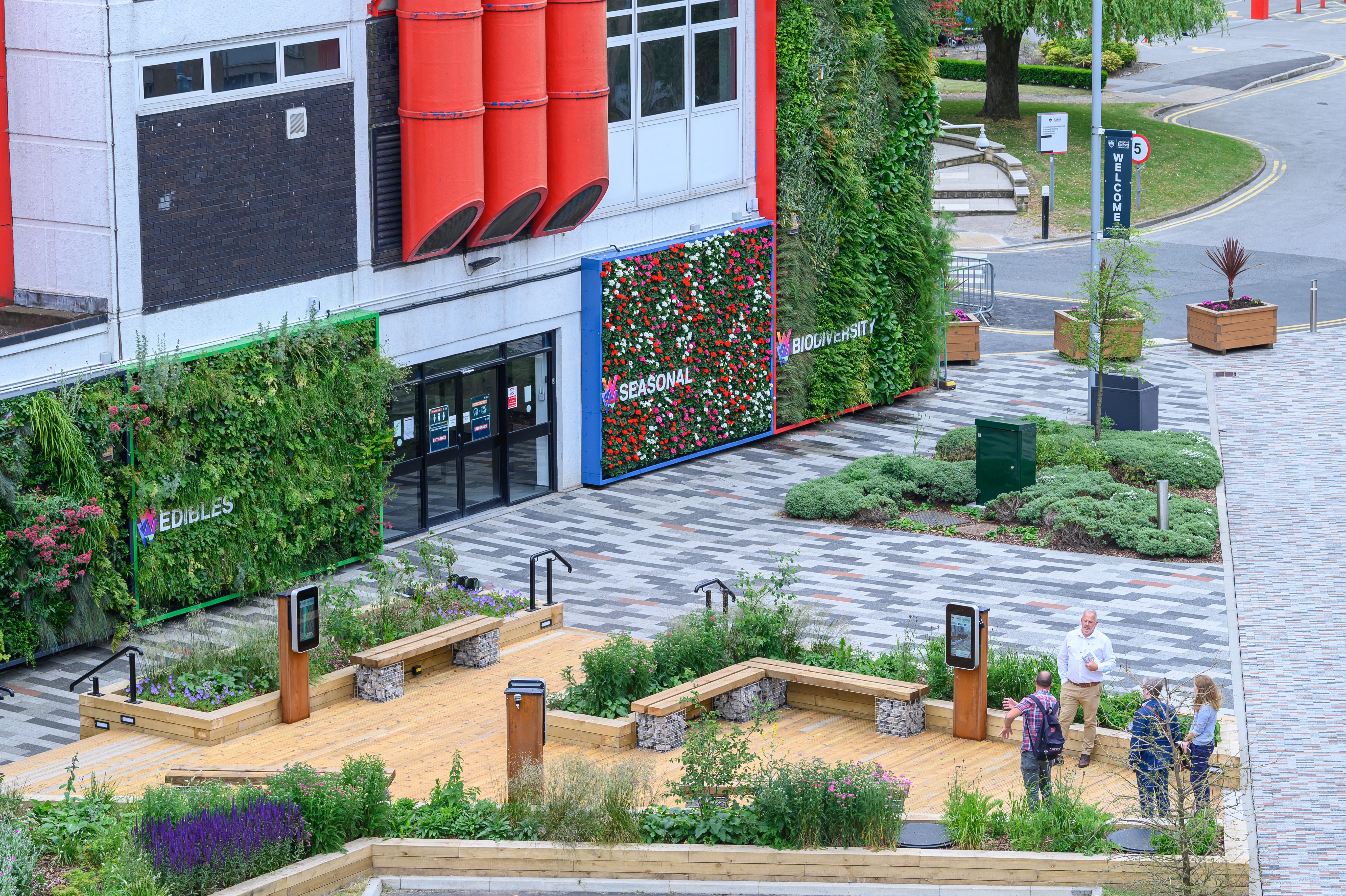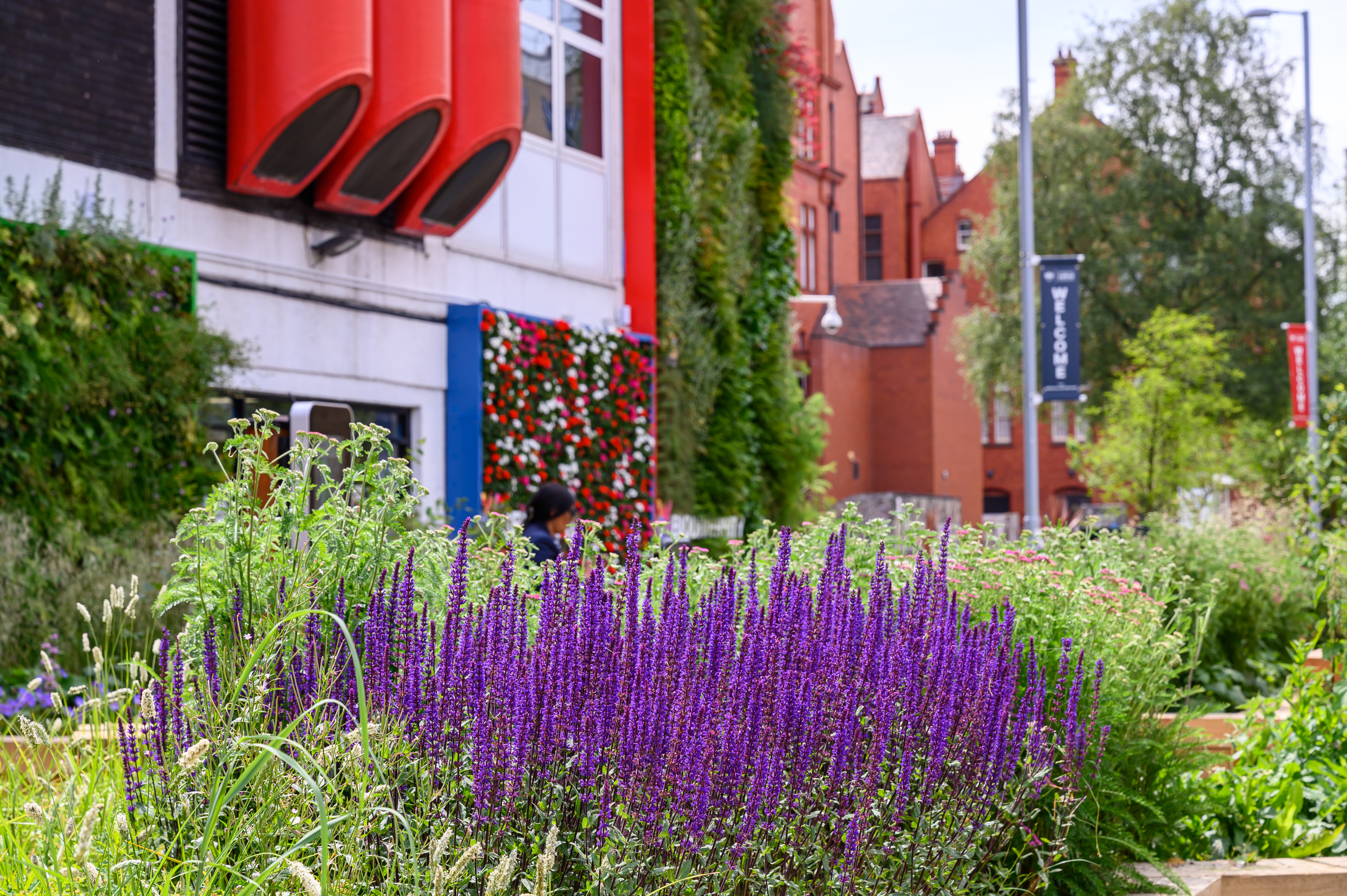City
Greater Manchester
Main actors
City Government, Regional Government, Private Sector, NGO / Philanthropy, Public Utility, Research Institutes / Universities
Project area
Whole City/Administrative Region
Duration
Ongoing since 2019
Increasing green infrastructure in Greater Manchester to help stop the effects of climate change.
This case study takes a closer look at the IGNITION project, a twelve-partner, EU-funded project which looks to establish innovative ways of financing urban nature-based solutions (NBS) that build resilience to climate change in Greater Manchester
Partners on this innovation project include local authorities, academia, business and local community organisations all with a common aim of helping Greater Manchester to meet the objectives set out by Greater Manchester Mayor, Andy Burnham, in the city-region’s Five-Year Environment Plan.
Financed by European Urban Innovative Actions (UIA) funding, the project is working at a city-region level to:
- develop the evidence necessary to prove the value of NBS and build confidence in the financial returns it can provide
- facilitate multi-stakeholder engagement to understand the barriers and opportunities in establishing the system change necessary to make urban NBS the norm
- develop replicable business models that will enable a transition to wide-scale investment in the roll out of urban NBS
- increase citizen and youth knowledge of NBS and give them the tools to share this knowledge with others
Greater Manchester, like many city regions, is experiencing the extreme effects of climate change. In 2019, the Greater Manchester Combined Authority (GMCA) declared a ‘climate emergency’ showing the authority’s commitment to creating a climate resilient city region.
That’s where the IGNITION project comes in.
Since its inception in 2019, the project is providing the tools needed to increase the use of NBS, such as greenspace, green walls and rain gardens, in Greater Manchester. The IGNITION project created an extensive Evidence Base which brought together 1,000+ items of research to show that NBS can dramatically improve our climate resilience, whilst providing a huge range of social and economic benefits. However, due to the lack of public funding currently available for NBS, IGNITION seeks to encourage private investment to help build funding models in Greater Manchester.
The project needed to establish a clear process for moving from the current situation, whereby NBS are generally financed on a site-by-site basis from statutory funding or grants to the point where large-scale private investment could be secured to roll out NBS at scale across Greater Manchester. IGNITION, therefore, set about developing a pipeline of NBS projects across the public estate in GM which could generate private investment.
The project has created a framework for understanding the existing level of green space across GM and is now looking to establish a metric to reflect an increase in functional green space which builds climate resilience rather than a generic increase in green space.
The IGNITION project team seeks to show innovation in all areas of the project, and set out to create a potential, ready-made way of placing a financial value on NBS in Greater Manchester. The North West’s water company, United Utilities, has a charging policy that incentivises sustainable drainage systems (SuDS) on non-domestic properties by offering a financial discount on wastewater charges where SuDS of sufficient size are installed. Alongside looking at sites that would be able to reduce their wastewater charges through this scheme, the team is identifying those sites where SuDS would have the most benefit in terms of reducing the risk of flooding incidents in the local areas.

This creates financial value through savings to United Utilities in reduced flooding incidents and to site owners through reduced charges that GMCA will seek to use to contribute to the cost of the SuDS and their maintenance over time. A replicable site-screening tool has been developed allowing for easy refinement of feasible sites. This has enabled the team to create a long list of around 600 sites based on the sites’ ground conditions and their potential to reduce surface water charges.
Further to this financing model, a future funding stream focused on understanding how existing climate-resilient parks and greenspaces can best be financed and to explore options for financing new climate-resilient parks and greenspaces has been identified. Parks and greenspace provide a range of social and environmental benefits across GM, however, in many cases core local authority budgets to maintain and maximise the functionality of these spaces are decreasing.
Building confidence in the functionality and benefits green space can provide is necessary to engage investors. The Living Lab at the University of Salford aims to show investors the benefits of incorporating NBS into their buildings.


At the heart of the project is the Living Lab at the University of Salford: an innovative, demonstration site that brings together NBS in an integrated system. The structure is the first cohesive NBS Living Lab in the world with a rain garden, green wall, green roof, and sustainable drainage trees laid out across two university buildings to provide a replicable model for businesses and local authorities. The Living Lab not only provides benefits to people and wildlife – namely wellbeing and increased biodiversity – the Lab will also help to reduce energy costs, improve building insulation, improve water quality, and reduce flood risk in the local vicinity. This impressive – and aesthetically pleasing! – element of the IGNITION project has been designed with collaboration from citizens, business, and local government. Now complete, the Living Lab will capture data on costs, energy savings and the benefits of NBS for the whole campus.
The Lab is not only of scientific importance for the University of Salford and other educational facilities across Greater Manchester, it is already proving successful in improving student wellbeing across the campus. Many students have been using the area to eat their lunch, study in and have even used it as a backdrop to student dance productions. Due to the Lab’s proximity to Peel Park, next to a public right of way, the Lab has been spotted and enjoyed by many passers-by with people stopping to read information on the Lab, take pictures, and enjoy its many other benefits.
In the coming months, the Living Lab will be an interactive showcase of NBS in action and provide a living legacy for IGNITION. With the constraints on in-person meetings brought on by the COVID-19 pandemic, the project will create a virtual tour making the Lab accessible globally. The evidence gathered will continue to inform the evidence base and the wider case for increasing NBS across Greater Manchester and in other urban areas.
Moving forward in the project, IGNITION continues to engage with citizens, community groups and young people from across Greater Manchester to give them the tools to campaign for NBS in their area and improve their knowledge of climate change and climate change adaptation. The IGNITION project team has released a Local Authority report, detailing the benefits of NBS-adoption for local councils and the starting point for creating the investment opportunities. They are also feeding into Government and the water regulators around their findings and experiences with a view to influencing future policy and removing barriers to investment in NBS.
The project is funded by Urban Innovative Actions (UIA), an Initiative of the European Union that provides urban areas throughout Europe with resources to test new and unproven solutions to address urban challenges. Based on article 8 of the European Regional Development Fund (ERDF), the Initiative had a total ERDF budget of EUR 372 million for 2014-2020.There are twelve partners of the IGNITION project:
- Greater Manchester Combined Authority
- Manchester City Council - municipality
- Salford City Council - municipality
- Environment Agency - environmental agency
- Business in the Community - business community representative
- United Utilities - business community representative
- UK Green Building Council - business community representative
- City of Trees - NGO
- Groundwork - NGO
- Royal Horticultural Society - NGO
- Manchester university - higher education and research institute
- Salford university - higher education and research institute
There are seven work packages across the project, with organisations working on the goals of separate ones, however, each organisation has a commitment to communicating the project to as wide an audience as possible.
Match funding is supplied by all partners, with a requirement for each partner to contribute 20% of total project costs out of their own resources – predominantly in the form of matched-in staff costs.
Feedback and learnings from the last two years of the project have demonstrated that a successful output of our priority business model would be a large-scale pilot funded through a mix of private, philanthropic investors and potentially, public, finance. A successful pilot will prove the model, building investor confidence and enabling us to attract private investment at scale in the future. If it can be demonstrated that NBS can generate cash flow at scale, investment in it would operate as other mainstream investment markets do.
Now that the Living Lab, our major project output, is complete, we can start to gather and analyse data from the construction. This will include statistics on water attenuation, heat savings and mental wellbeing. We can then add this data to our Evidence Base as a robust study to improve investor confidence in NBS.
The IGNITION Evidence Base brings together 1,000+ Evidence Items which can be viewed by organisations and building managers to understand the impacts of incorporating NBS into their existing building or a future site.
An IGNITION green roofs tool will also be going live in Summer 2021, allowing building managers and owners to calculate the costs and benefits of putting a green roof on their facility. We will be able to collect data from this tool, telling us the kinds of businesses that are partaking, therefore allowing us to tailor our communications outputs.
Procuring the Living Lab has not been without its challenges. Due to the innovative nature of the project, the Lab did initially come up against some challenges when going out to tender:
- The Living Lab’s brief specifically asked for creative proposals from those who wished to submit a tender and specified that only innovative briefs would be awarded the contract (over more cost-effective solutions).
- Innovative solutions always include unknown ground, and this makes their correct procurement difficult. Starting with procuring a small test case has shown to be helpful. Here, failures could be made at low risk and easily corrected. The test case provided important lessons for the smooth procurement of complex solutions.
- A collaborative approach to working with stakeholders and contractors ensured agility and ongoing development of the design. Due to the range of partners working together across the project, the team was able to work collaboratively to ensure all areas and stakeholders were covered in the briefing document, enabling the best candidate to be picked for the job and ensuring all criteria were covered.
Alongside innovation, transferability is a driving principle of the IGNITION project. Replication of the project’s approach to activities is considered at all stages; both in other cities and within Greater Manchester following the project, to ensure that IGNITION delivers a legacy beyond its three-year funding period. In practice, this is demonstrated by project reports containing specific sections on steps required to replicate the approach taken, and project outputs - such as an NBS evidence base - being publicly accessible where possible.
In addition to a commitment to transfer project resources, sharing lessons learned was a key assessment criterion within the original IGNITION bid to the funder (the UIA). Work Package 8 of the project is wholly focused on dissemination and knowledge sharing, with deliverables including a requirement to produce a project-wide lessons learned report; attending and presenting at EU conferences; and hosting workshops with Greater Manchester’s local authorities. Lessons learned are proactively recorded and as with replication, project reports specifically include a section which is open and honest regarding the challenges and lessons learned from the activity undertaken.
External links / documents
On Map
The Map will be displayed after accepting cookie policy

